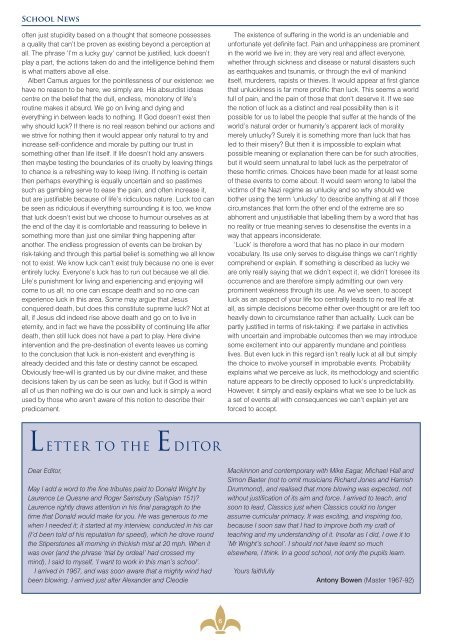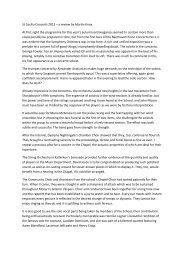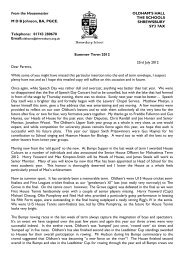The Salopian no. 152 - Shrewsbury School
The Salopian no. 152 - Shrewsbury School
The Salopian no. 152 - Shrewsbury School
You also want an ePaper? Increase the reach of your titles
YUMPU automatically turns print PDFs into web optimized ePapers that Google loves.
<strong>School</strong> Newsoften just stupidity based on a thought that someone possessesa quality that can’t be proven as existing beyond a perception atall. <strong>The</strong> phrase ‘I’m a lucky guy’ can<strong>no</strong>t be justified, luck doesn’tplay a part, the actions taken do and the intelligence behind themis what matters above all else.Albert Camus argues for the pointlessness of our existence: wehave <strong>no</strong> reason to be here, we simply are. His absurdist ideascentre on the belief that the dull, endless, mo<strong>no</strong>tony of life’sroutine makes it absurd. We go on living and dying andeverything in between leads to <strong>no</strong>thing. If God doesn’t exist thenwhy should luck? If there is <strong>no</strong> real reason behind our actions andwe strive for <strong>no</strong>thing then it would appear only natural to try andincrease self-confidence and morale by putting our trust insomething other than life itself. If life doesn’t hold any answersthen maybe testing the boundaries of its cruelty by leaving thingsto chance is a refreshing way to keep living. If <strong>no</strong>thing is certainthen perhaps everything is equally uncertain and so pastimessuch as gambling serve to ease the pain, and often increase it,but are justifiable because of life’s ridiculous nature. Luck too canbe seen as ridiculous if everything surrounding it is too, we k<strong>no</strong>wthat luck doesn’t exist but we choose to humour ourselves as atthe end of the day it is comfortable and reassuring to believe insomething more than just one similar thing happening aftera<strong>no</strong>ther. <strong>The</strong> endless progression of events can be broken byrisk-taking and through this partial belief is something we all k<strong>no</strong>w<strong>no</strong>t to exist. We k<strong>no</strong>w luck can’t exist truly because <strong>no</strong> one is everentirely lucky. Everyone’s luck has to run out because we all die.Life’s punishment for living and experiencing and enjoying willcome to us all; <strong>no</strong> one can escape death and so <strong>no</strong> one canexperience luck in this area. Some may argue that Jesusconquered death, but does this constitute supreme luck? Not atall, if Jesus did indeed rise above death and go on to live ineternity, and in fact we have the possibility of continuing life afterdeath, then still luck does <strong>no</strong>t have a part to play. Here divineintervention and the pre-destination of events leaves us comingto the conclusion that luck is <strong>no</strong>n-existent and everything isalready decided and this fate or destiny can<strong>no</strong>t be escaped.Obviously free-will is granted us by our divine maker, and thesedecisions taken by us can be seen as lucky, but if God is withinall of us then <strong>no</strong>thing we do is our own and luck is simply a wordused by those who aren’t aware of this <strong>no</strong>tion to describe theirpredicament.<strong>The</strong> existence of suffering in the world is an undeniable andunfortunate yet definite fact. Pain and unhappiness are prominentin the world we live in; they are very real and affect everyone,whether through sickness and disease or natural disasters suchas earthquakes and tsunamis, or through the evil of mankinditself, murderers, rapists or thieves. It would appear at first glancethat unluckiness is far more prolific than luck. This seems a worldfull of pain, and the pain of those that don’t deserve it. If we seethe <strong>no</strong>tion of luck as a distinct and real possibility then is itpossible for us to label the people that suffer at the hands of theworld’s natural order or humanity’s apparent lack of moralitymerely unlucky? Surely it is something more than luck that hasled to their misery? But then it is impossible to explain whatpossible meaning or explanation there can be for such atrocities,but it would seem unnatural to label luck as the perpetrator ofthese horrific crimes. Choices have been made for at least someof these events to come about. It would seem wrong to label thevictims of the Nazi regime as unlucky and so why should webother using the term ‘unlucky’ to describe anything at all if thosecircumstances that form the other end of the extreme are soabhorrent and unjustifiable that labelling them by a word that has<strong>no</strong> reality or true meaning serves to desensitise the events in away that appears inconsiderate.‘Luck’ is therefore a word that has <strong>no</strong> place in our modernvocabulary. Its use only serves to disguise things we can’t rightlycomprehend or explain. If something is described as lucky weare only really saying that we didn’t expect it, we didn’t foresee itsoccurrence and are therefore simply admitting our own veryprominent weakness through its use. As we’ve seen, to acceptluck as an aspect of your life too centrally leads to <strong>no</strong> real life atall, as simple decisions become either over-thought or are left tooheavily down to circumstance rather than actuality. Luck can bepartly justified in terms of risk-taking: if we partake in activitieswith uncertain and improbable outcomes then we may introducesome excitement into our apparently mundane and pointlesslives. But even luck in this regard isn’t really luck at all but simplythe choice to involve yourself in improbable events. Probabilityexplains what we perceive as luck, its methodology and scientificnature appears to be directly opposed to luck’s unpredictability.However, it simply and easily explains what we see to be luck asa set of events all with consequences we can’t explain yet areforced to accept.L ETTER TO THE E DITORDear Editor,May I add a word to the fine tributes paid to Donald Wright byLaurence Le Quesne and Roger Sainsbury (<strong>Salopian</strong> 151)?Laurence rightly draws attention in his final paragraph to thetime that Donald would make for you. He was generous to mewhen I needed it; it started at my interview, conducted in his car(I’d been told of his reputation for speed), which he drove roundthe Stiperstones all morning in thickish mist at 20 mph. When itwas over (and the phrase ‘trial by ordeal’ had crossed mymind), I said to myself, ‘I want to work in this man’s school’.I arrived in 1967, and was soon aware that a mighty wind hadbeen blowing. I arrived just after Alexander and CleodieMackin<strong>no</strong>n and contemporary with Mike Eagar, Michael Hall andSimon Baxter (<strong>no</strong>t to omit musicians Richard Jones and HamishDrummond), and realised that more blowing was expected, <strong>no</strong>twithout justification of its aim and force. I arrived to teach, andsoon to lead, Classics just when Classics could <strong>no</strong> longerassume curricular primacy. It was exciting, and inspiring too,because I soon saw that I had to improve both my craft ofteaching and my understanding of it. Insofar as I did, I owe it to‘Mr Wright’s school’. I should <strong>no</strong>t have learnt so muchelsewhere, I think. In a good school, <strong>no</strong>t only the pupils learn.Yours faithfullyAntony Bowen (Master 1967-92)6





